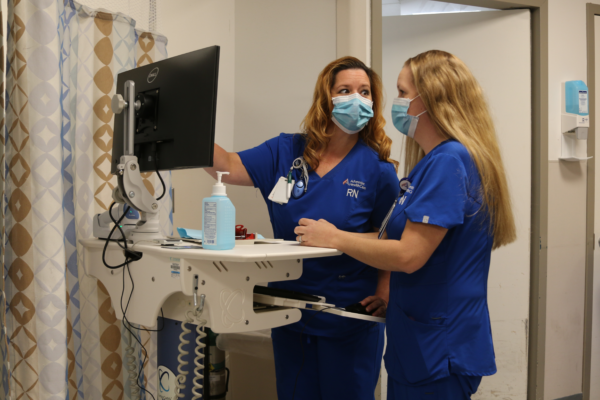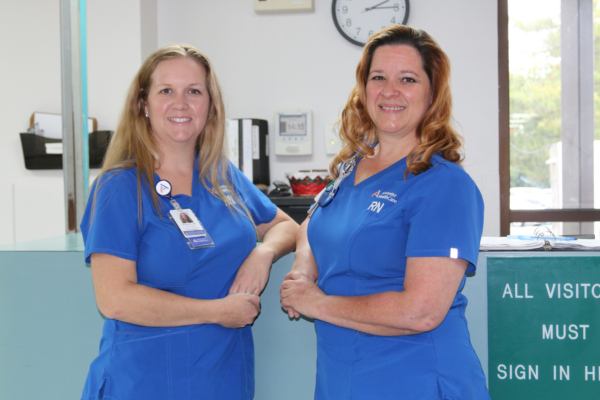This content is sponsored by Adventist HealthCare Fort Washington Medical Center.
Being a helpful person has been a lifelong calling for Jhonni Jones.
As a child, Jones would try to take care of every stray animal she could find, and she would be there to assist family members as her cousins, nieces and nephews were growing up.
“Ever since I was a little girl my mom always told me I would become a nurse,” Jones said. “I was always the one who was trying to nurture everybody.”
Her career has reflected that.
Jones works as an assistant nurse manager in the emergency department at Adventist HealthCare Fort Washington Medical Center.
She has been with the hospital since 2001, and before that she worked in a nursing home and as an emergency medical technician.
“Everything I’ve done since I was a teenager has been related to healthcare,” Jones said.
But nothing has been quite as rewarding as what she has experienced in the Fort Washington emergency department.
“The people here have given me a sense of belonging and a sense of family,” Jones said. “I feel like I have a purpose because the people I work with and the people I meet in this community are outstanding.”
‘Organized chaos’
The emergency department at Adventist HealthCare Fort Washington Medical Center has 14 beds and receives an average of 80 patients every day.
“I describe it by calling it organized chaos,” Jones said. “We are prepared to handle whatever comes our way.”
 This week is Emergency Nurses Week, as observed by the Emergency Nurses Association. Each day, emergency nurses face difficult situations, emotional patient scenarios, and challenging days, but, as Jones observed, the team at Adventist HealthCare Fort Washington Medical Center always emerges standing strong and united in their goal of delivering quality and compassionate patient care.
This week is Emergency Nurses Week, as observed by the Emergency Nurses Association. Each day, emergency nurses face difficult situations, emotional patient scenarios, and challenging days, but, as Jones observed, the team at Adventist HealthCare Fort Washington Medical Center always emerges standing strong and united in their goal of delivering quality and compassionate patient care.
At any given time, the emergency staff could be caring for patients who are walking in through the front door on their own or being rushed in by an ambulance.
Some patients have serious injuries while others may just describe general symptoms, such as pressure in their chest.
“We have a lot of very strong nurses who are able to adapt,” Jones said. “We are all quick on our feet and we’re very good at identifying what is and isn’t an emergency.”
According to Jones, the emergency “triage nurse” may have the most difficult role in the hospital because it is their job to look at the patient immediately and provide the initial exam.
“They have to have very keen skills,” Jones said. “They have to know how to hone in very quickly to figure out what is wrong with that patient and what direction we’re going.”
A growing hospital for a growing community
Hospital leaders have outlined a plan for the future that includes a larger, state-of-the-art hospital with a robust provider network and a long list of specialty services.
This garrison of providers will be spread more evenly across a region where residents too often face a lack of options when it comes to their health.
“This community is getting bigger by the day,” said Brittany Keys, the emergency department manager at Adventist HealthCare Fort Washington Medical Center. “We need to make sure that we have the space and the resources to be able to care for the people here so they aren’t forced to leave their own community to get service.”
Among the hospital’s growth plans are a larger and updated emergency department.
Waiting for a spot in the emergency room can be time-consuming, so it’s helpful for patients to know when a situation warrants the emergency department or urgent care.
“Patients are always welcome to come to the emergency department. They’re never a bother to us and will never be turned away,” Keys said. “But if you’re having cold symptoms such as a cough or sore throat, those things should be handled by urgent care.”
Things like school and sports physicals, vaccines, earaches, minor bruises and cuts can also typically be dealt with through an urgent care visit.
However, patients should go to the emergency department if they have symptoms such as severe bleeding, chest pain, trouble breathing or serious allergic reactions.
Major stomach pain that won’t go away, for example, should also be handled by the emergency department.
“Abdominal pain isn’t something that is so easily managed in an urgent care setting because sometimes you have to dig a little bit deeper with CAT scans and things that are not offered in urgent care,” Keys explained.
Near you, for you
 Similar to Jones, Keys has been working to help people throughout her life, deciding in high school that she wanted to be a nurse.
Similar to Jones, Keys has been working to help people throughout her life, deciding in high school that she wanted to be a nurse.
“I always knew that I wanted to interact with as many patients as I could,” said Keys. “As nurses, we see patients from seconds after they’re born until they’re 100-years-old.”
Keys has been with the team at Adventist HealthCare Fort Washington Medical Center since 2012.
“We have nurses who have worked here for more than 20 years,” Keys said. “Everybody knows everybody and everyone knows everyone’s kids.”
She said it’s been exciting to see the hospital grow as it works to reduce local health care disparities in southwestern Prince George’s County.
“We’re serving the members of this community where most of us live,” Keys said. “This team is like my family. I wouldn’t want to work anywhere else.”







